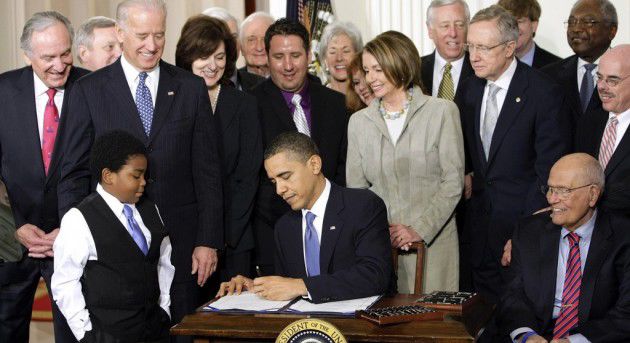Conservative take on ACA dismissal
March 27, 2017
Last Friday, March 24, House Republicans pulled the American Healthcare Act—a bill that would have repealed and replaced the Affordable Care Act—from a floor vote that was scheduled for that afternoon. Voting for the bill was originally set for last Thursday, but Republicans delayed it when they saw that they didn’t have enough votes to pass it. President Trump threatened House Republicans, warning that he would drop ACA repeal efforts altogether if the bill didn’t pass the next day. Thank God it didn’t even get the chance.
I still believe that Trump and congressional Republicans should work on a replacement. But as of this writing, Republicans seem to have given up on replacing ACA. If Republicans give up on healthcare reform as they say that they will, it will be a mistake. Nevertheless, if abstaining from ACA repeal is a mistake—this bill would have been a worse one had it passed.
The AHCA was despised by virtually everyone. Democrats hated it because they cherish the ACA, but also because the bill could have meant millions losing coverage. Moderate Republicans shared the same concern. Meanwhile conservative Republicans feared that the bill kept too much of ACA intact. All three groups had legitimate worries about this bill.
The AHCA kept too much of ACA’s regulatory structure. It kept ACA’s protection for patients with preexisting conditions in place. But it also replaced the individual mandate—which compelled everyone to buy insurance under threat of a fine—with a 30 percent surcharge for people who didn’t maintain continuous coverage for at least three months. ACA’s main structural problem, rising premiums, is the result of exactly that sort of policy. Insurers lose money by covering sick patients, which is why in the pre-ACA system, they denied coverage to people with preexisitng conditions or spiked their premiums. By making insurers cover high-risk patients, ACA caused many insurers to lose money, resulting in many leaving the healthcare exchanges or spiking premiums on everyone else. The individual mandate was implemented to offset insurer losses by making everyone purchase insurance or pay a penalty. Many people decided to forgo insurance and pay the fine since they could just buy insurance when they got sick with no worries. The AHCA would have exacerbated this problem.
There was no real reason to think that the 30 percent surcharge (which was really a price control for insurers to implement) would have made more people buy insurance than the ACA did. After all, if you’re young and healthy and consider buying insurance after three months, a 30% percent hike might be unappealing. But if you’re sick, you may decide that insurance is worth buying, even with the surcharge. If you’re healthy (because you have no costs otherwise without ACA’s penalty), you have no real incentive to buy insurance. So insurers would have continued losing money covering the sick while jacking up premiums on the healthy who want insurance. Meanwhile, the number who want insurance would probably diminish.
Republicans who called the AHCA “ACA Lite” were right, partially for this reason. But the bill kept other aspects of ACA intact as well, retaining the ACA’s Medicaid expansion until 2020 when it would begin phasing out. Given Medicaid’s exorbitant expenses and crummy payment structure, which tends to underpay doctors, conservatives worried about the bill maintaining the expansion since it would make a costly, but unproductive, entitlement program grow. It also kept some of ACA’s other regulations.
But moderates and liberals had legitimate worries too. For multiple reasons, the Congressional Budget Office projected that the plan would cause 24 million people to lose insurance over a decade. To be fair, as many healthcare experts have noted, there was reason to doubt the CBO’s projections. The bill would have also provided a tax credit to many people so that they could purchase insurance, but the credit wasn’t generous enough for people in the lower-middle class. Even if 24 million didn’t lose coverage, undoubtedly some millions still would have.
Between higher premiums and probable coverage losses, there was good reason to oppose this bill. In attempting to retain parts of ACA’s regulatory structure, while simultaneously being stingy with subsidies and tax credits, the AHCA would have been a political disaster. Republicans should have repealed more of ACA’s regulations and made the tax credit more generous. The AHCA should have created a continuous coverage provision that protected people with preexisting conditions only if they maintained continuous coverage, giving people an actual incentive to buy health insurance. This way, insurers would offset costs from covering sick patients because more people would have a reason and means to buy insurance. Otherwise, insurers could have been free to experiment and innovate to lower premiums through competition.
This bill was ultimately a ramshackle effort to rush healthcare legislation so that Trump could check a box off a laundry list of campaign promises. Trump knows nothing about healthcare policy. His endorsement of this bill shows it and it’s hard to see where his presidency goes next since he lacks an eye for policy detail. By the time the Democrats passed the ACA, they had already worked out a vision for healthcare in the decades prior. They also took thirteen months to work out the ACA’s details. Had Trump and Republicans taken their time working out a vision, they would have been better off. Conservatives shouldn’t be sad to see this bill go. But they should be if Republicans abandon the effort to reform healthcare altogether in its aftermath.



